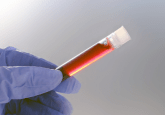A new blood test for chronic fatigue syndrome: fatigue finally figured out?

The world’s first blood test that diagnoses myalgic encephalomyelitis/chronic fatigue syndrome (ME/CFS) has demonstrated an impressive 96% accuracy. Let’s delve into how it works.
Scientists from the University of East Anglia (Norwich, UK) and Oxford BioDynamics (Oxford, UK), in collaboration with the London School of Hygiene & Tropical Medicine (London, UK) and Royal Cornwall Hospitals NHS Trust (Truro, UK), have shared the results of their new blood test capable of diagnosing ME/CFS. The test marks a turning point in expanding our understanding of this medical enigma, and could provide a straightforward, reliable way to confirm diagnosis.
So, what exactly is ME/CFS?
A complex, long-term illness marked by extreme fatigue, immune dysfunction and cognitive impairment, ME/CFS affects as many as 24 million people worldwide. The condition has historically been dismissed or misdiagnosed due to a lack of reliable diagnostic tools, and many patients endure years of uncertainty and delayed care. In addition to a lack of confirmatory tests, the cause, or causes, are not well understood; ME/CFS is thought to be multifactorial, with varied onset and numerous potential contributing factors.
The role of epigenetics
More recently, research has homed in on understanding the role that immune system disruption and epigenetic changes may play. Here, the team focused specifically on chromosome conformations, the 3D folding patterns of DNA, which are involved in regulating gene expression and intercellular communication in immune cells.
Building on prior research using Oxford BioDynamics’ EpiSwitch® technology, in which the team identified disease-specific chromosome conformations in the blood of patients with conditions such as rheumatoid arthritis and severe COVID-19, they investigated whether the EpiSwitch platform could be applied in a similar way for detecting epigenetic changes in ME/CFS.
“Chronic fatigue syndrome is not a genetic disease you’re born with. That’s why using EpiSwitch ‘epigenetic’ markers — which can change during a person’s life, unlike fixed genetic code — was key to reaching this high level of accuracy,” commented OBD Chief Scientific Officer Alexandre Akoulitchev.
You may also be interested in:
- Novel liquid biopsy test enhances early cancer detection with high accuracy
- Two new p-tau assays launched to advance Alzheimer’s research
- LC–MS/MS for quantitation of protein biomarkers
The study
Using the EpiSwitch platform, the team analyzed blood samples from 47 patients with severe ME/CFS and 61 healthy controls. They were able to identify a distinct epigenetic signature, more specifically, changes in how DNA is folded in immune cells, that was present solely in ME/CFS patients.
The test achieved an incredible 92% sensitivity and 98% specificity, demonstrating high reliability in identifying ME/CFS, as well as those who do not have the disease. Researchers also found signs of immune inflammation pathways involved in the disease, offering clues for potential treatments.
“Understanding the biological pathways involved in ME/CFS opens the door to developing targeted treatments and identifying which patients might benefit most from specific therapies,” UEA’s lead researcher Professor Dmitry Pshezhetskiy commented.
The future
While the innovative approach has been praised, the small cohort and focus on only severe cases limit its current reliability as a biomarker. Experts urge caution, noting the need for larger studies and broader patient sampling to validate the test before clinical application.
Nevertheless, the findings are promising, and the team is optimistic that the same technology could also help detect long Covid and other complex inflammatory conditions, which could advance precision diagnostics for misunderstood diseases:
“Post-Covid syndrome, commonly referred to as long Covid, is one example of ME/CFS, where a similar cluster of symptoms is triggered by the Covid-19 virus, rather than by other known causes such as glandular fever. We therefore hope that our research will also help pave the way for a similar test to accurately diagnose long Covid,” Professor Pshezhetskiy added.
“This is a significant step forward. For the first time, we have a simple blood test that can reliably identify ME/CFS – potentially transforming how we diagnose and manage this complex disease.”






